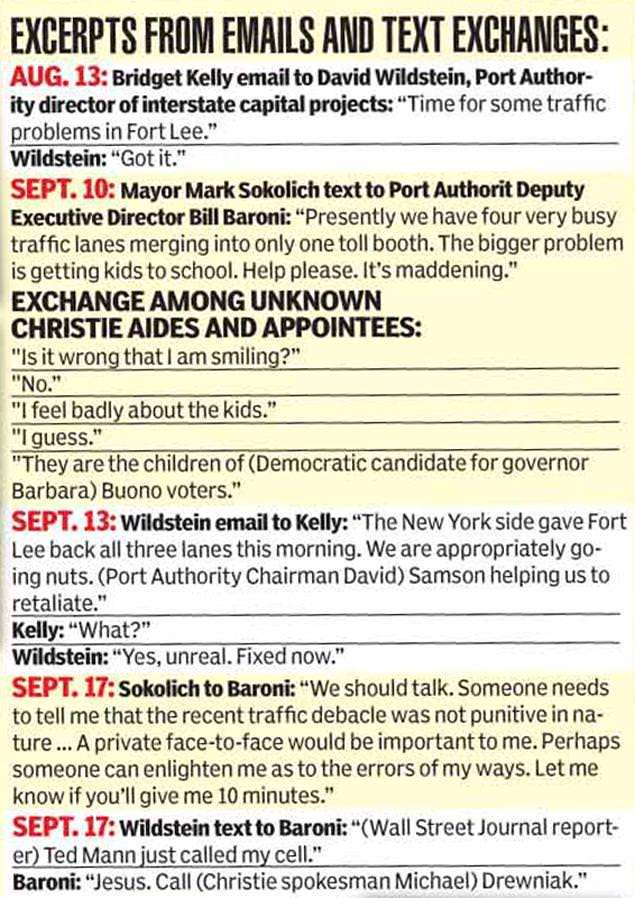Christie's Traffic and Hillary's War Decision-Making Are Reminders That a Politician's Job Is To Get Elected, No Matter the Human Cost
Before New Jersey Gov. Chris Christie gobbled up most of the country's political oxygen this week with his administration's seemingly retributive traffic policies, the political-scandal market was being serviced by various insults emanating from former Defense Secretary Robert Gates' new book, Duty: Memoirs of a Secretary at War. Though the two stories on the surface would seem to have nothing in common, dig a fingernail into both and you'll quickly hit the same conclusion: Politicians and the organizations around them are largely in the business of getting elected, for which they will use whatever tool, or stake whatever position they can get away with. Even at the potential cost of human lives.
The Christie-administration scandal is clear on this front. At the very least, people in the governor's circle of trust—including his longtime campaign manager, the well-connected GOP politico and Jersey power broker Bill Stepien—were privately gleeful at the pain inflicted on residents and even children by traffic closures they engineered and then stonewalled the press and Fort Lee Mayor Mark Sokolich about. This is one of the more nauseating displays:
In one exchange of text messages on the second day of the lane closures, [David] Wildstein, [one of two Christie appointees at the Port Authority,] alludes to messages Fort Lee Mayor Mark Sokolich had left complaining that school buses were having trouble getting through the traffic.
"Is it wrong that I'm smiling," the recipient of the text message responded to Wildstein. The person's identity is not clear because the documents are partially redacted for unknown reasons.
"No," Wildstein wrote in response.
"I feel badly about the kids," the person replied to Wildstein. "I guess."
"They are the children of Buono voters," Wildstein wrote, making a reference to Barbara Buono, the Democratic candidate for governor, who lost to Christie in a landslide in November.

While Christie loyalists were joshing about the traffic problems of Fort Lee residents, an unconscious 91-year-old woman lay waiting in Fort Lee for an ambulance that was delayed in the jam. The woman later died.
It's a grotesque Jersey version of the ugly truth that underlies all electoral politics: The primary goal is to win re-election. There's a reason that the same people who work on political campaigns then work for important jobs in government—it's largely the same job, with the same boss, and the same goal. Take a look at Bill Stepien's resume:
In between Christie campaigns, Stepien worked in Trenton as the governor's deputy chief of staff for legislative and intergovernmental affairs, and was the architect of the governor's trademark town hall meetings. He previously worked for U.S. John McCain's presidential campaign and was national field director for former New York City Mayor Rudy Giuliani.
Think of these kinds of careers, and of the callous disregard these people can have for voters and insufficiently loyal politicians (Stepien's reaction to Fort Lee Mayor Mark Sokolich's public complaints about the traffic jam was "The mayor is an idiot"), the next time you hear someone describe politics as public service. When you give politicians power—such as the authority to appoint leaders to bi-state public bodies that control basically all the infrastructure in and around New York City and New Jersey—you are handing over tools that they and the many plausible deniers that work for them can and will use to get the boss man re-elected. It is disgusting, and it is predictable. If you want less corruption, give politicians less power.
That goes for the woman who Christie started this week thinking he may run against for president in 2016. Though it hasn't gotten nearly the same press, Robert Gates has this to say about Hillary Clinton and her former Democratic-primary rival, Barack Obama:
Hillary told the president that her opposition to the [2007] surge in Iraq had been political because she was facing him in the Iowa primary…. The president conceded vaguely that opposition to the Iraq surge had been political. To hear the two of them making these admissions, and in front of me, was as surprising as it was dismaying.
Regardless of what one thinks of the Iraq surge (I was against it, FWIW), the idea of a future secretary of state and future president making life-and-death policy decisions based on their own crass political considerations is fundamentally grotesque. And it shouldn't surprise anybody. Their job is to get elected; ours is to stop getting bamboozled. If you don't want your fellow citizens to be used as human pawns in the debased game of power politics, then work to limit the amount of latitude politicians can have over our lives.


Show Comments (58)